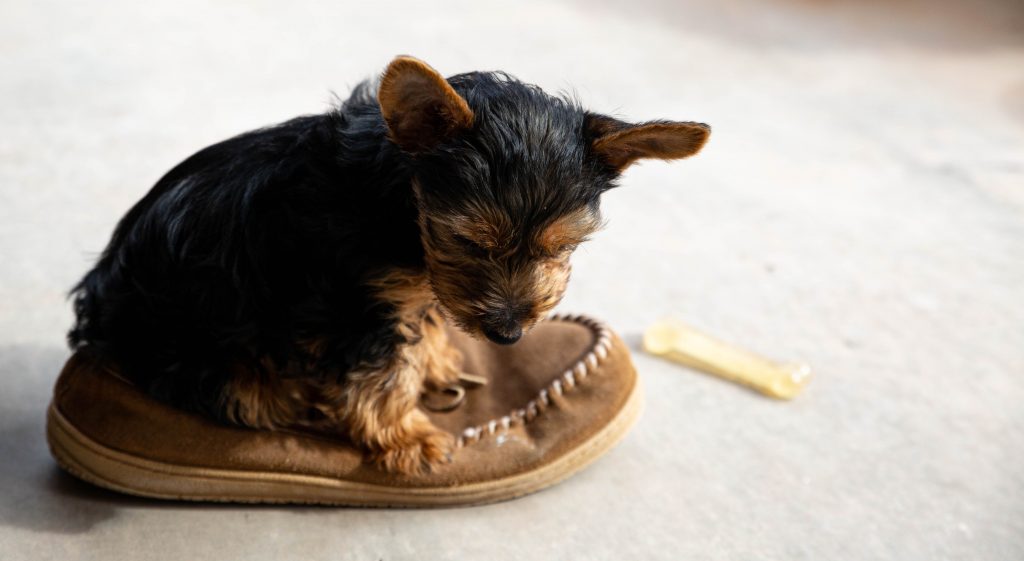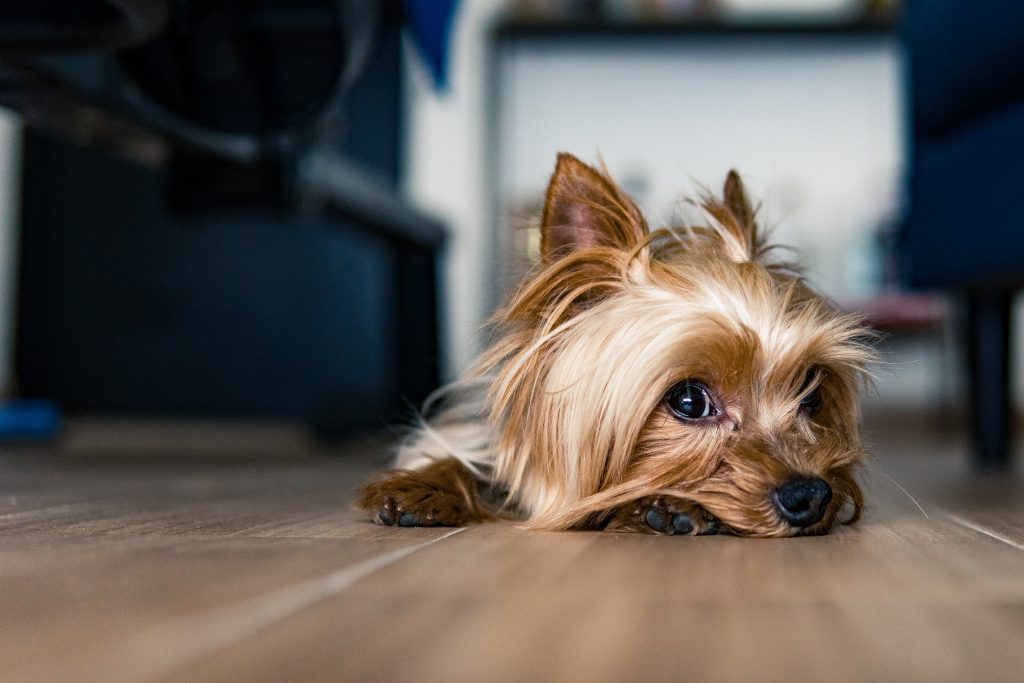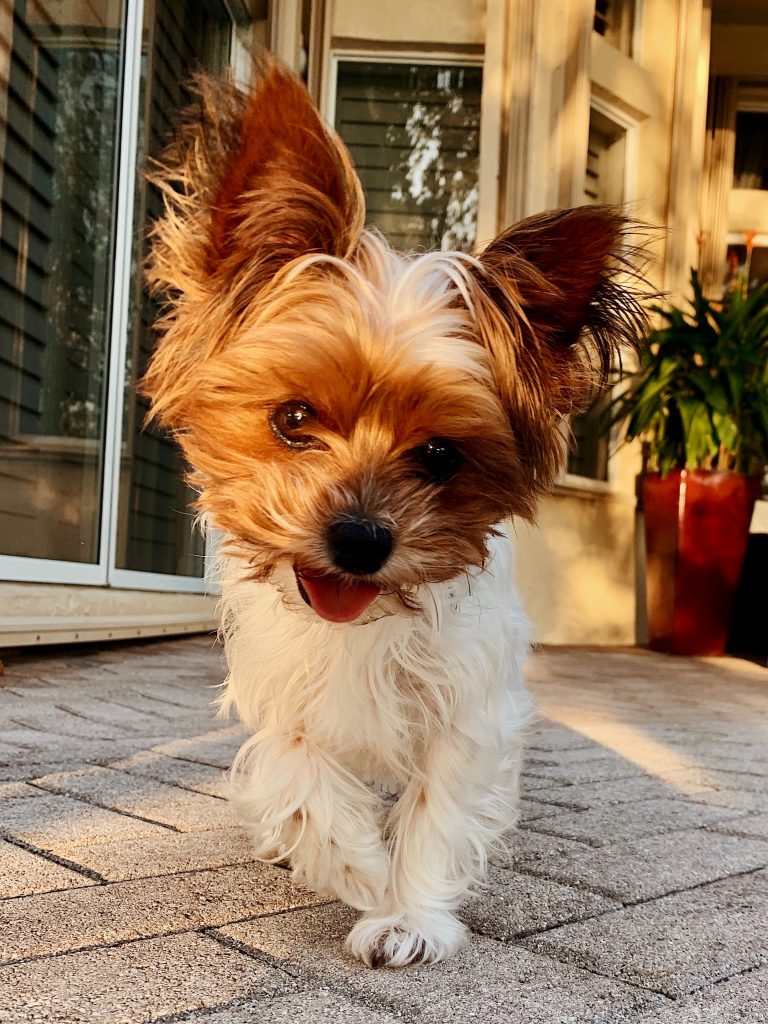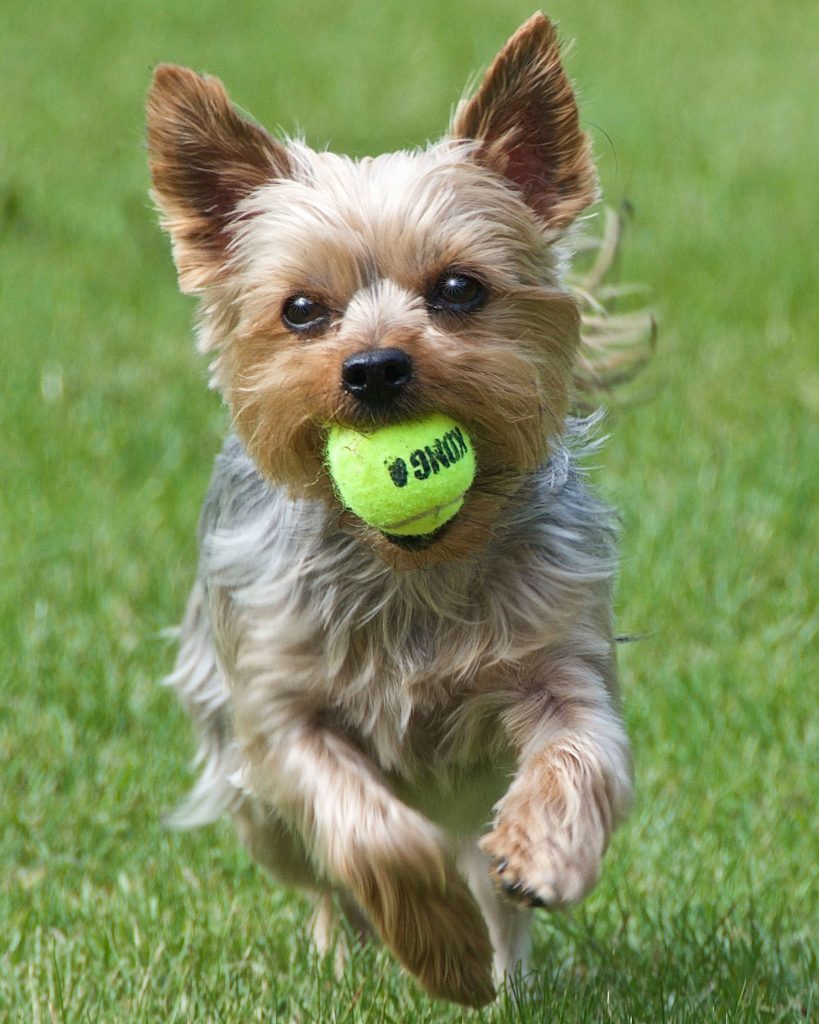Are you thinking of buying a rare Yorkie, but you still haven’t decided which color to choose? Well, one thing is for sure – rare Yorkie colors catch everyone’s eye and steal everyone’s heart. They come in a wide range of color varieties and are often priced higher than the standard ones. In case you want to find out all the facts about these lovable pooches, then this blog post is for you.
What are the different colors of Yorkies?
Like any other dog breed, Yorkies can come in a variety of coat colors. Alongside the coat colors approved by the AKC, people often find themselves drawn to the allure of rare Yorkie colors. The only notable difference between standard and rare Yorkie colors is that the rare ones are not eligible to participate in shows. Moreover, breeding rare Yorkies is a more challenging task, which explains why they are often priced higher compared to their more common counterparts.
In the following lines, you’ll find the list of standard and exotic Yorkies.
Standard Yorkie coat colors:
Black and Tan Yorkie:
This is the most popular and traditional color. The body is black, and the legs, chest, and face are tan.
Blue and Tan Yorkie:
This is a rare color variation in which the black coat is changed by a striking shade of blue, and tan markings add to the look. These cute little furballs have the genes for both black (B) and tan (at), which makes their coat pattern unique. The way these genes work together gives the standard black and tan Yorkie its beautiful contrast, which is why people who love Yorkshire Terriers choose them.
Black and Gold Yorkie:
Black and Gold is similar to Black & Tan, but the “gold” part means that the tan color is darker and richer.Their shiny gold spots on a dark black coat give them a dazzling and luxury look that is hard to resist. These beautiful furry friends have the genes for black (B) and gold (Ay), which make their coat pattern so beautiful.
Because of how these genes work together, black and gold Yorkies have strikingly different colors. This makes them a real sight to see. They stand out from other Yorkshire Terriers because of how unique and royal they look. This gives them a special place in the hearts of dog fans everywhere.
Even though these are the AKC-approved colors for beauty events and shows, Yorkshire Terriers can naturally come in a wide range of other colors and patterns, some of which are rare or not standard. The AKC rules say that pets with these non-standard colors might still make great pets, but they might not be able to compete in shows.

Rare Yorkie colors:
Biewer Yorkies:
Biewer is a rare and exquisite tricolor coat pattern that consists of a white base with black and tan patterns in strategic places.
Golden Yorkies:
Yorkies can also come in a rarer golden color, which features a shiny coat and makes them stand out from the standard Yorkie colors.
Platinum blonde Yorkies:
Platinum blonde is a unique and beautiful coat color that leans toward a silvery white. These rare Yorkies have a beautiful and unique coat color that makes them stand out from the more standard colors.
The word “platinum” comes from the color of their coat, which is light and almost looks like silver. This gives them an air of grace and charm. The platinum color comes from a mix of certain genes that give the dog an eye-catching and desirable look.
Platinum Yorkies get a lot of attention and respect from enthusiasts and dog lovers alike because they are so rare and beautiful. .
Sable Yorkies:
The word “sable” refers to the dark color at the tips of the hair, which gradually fades into a lighter color at the base. This gives the hair a beautiful and lively look. Sable Yorkies are one of the rarest colors of Yorkies.
Because they are so rare, people who want a Yorkie with a unique and eye-catching coat like to buy them. Their beauty goes beyond how they look, because they still have the sweet, loving personality that makes Yorkies such popular pets. The Sable Yorkie could be the perfect dog for your family if you want a Yorkshire Terrier with a unique coat and a bit of a rare look.
Parti-Merle Yorkies:
The Parti-Merle coat pattern is the result of a very unusual gene combination between the Parti and Merle genes. Breeders produce them by combining both the Parti and Merle genes. The white spots and patterns on their body come from the Parti Yorkie gene, while the Merle gene gives them a marbled and mottled look.
This gives them a look that is hypnotic and visually striking, which makes them different from regular Yorkies. Due to how hard it is to breed for these specific traits and how rare the combination of Parti-Merle is, these Yorkies cost more than their more common peers.
Ocean Pearl Yorkies:
Ocean Pearl Yorkies have a beautiful coat that makes them look like shimmering treasures from the sea. The reason for this beautiful color lies in the complicated world of genes and breeding. Breeders who know what they’re doing carefully choose parents with certain gene pairs, including the hard-to-find merle gene, which is responsible for the Ocean Pearl coat pattern.
By carefully matching these colors, you get a beautiful blend of blue and gold that looks like the ocean under the moonlight. Ocean Pearl is the most expensive of the rare Yorkie colors because it is hard to get and requires careful breeding. People say that beauty has a price, and having one of these ethereal companions is like having a live work of art that is graceful and attractive everywhere you look. This is definitely one of the most expensive rare Yorkie colors.
Lilac Yorkies:
Lilac Yorkies are made when a certain set of genes from their parent Yorkies come together. The dilute gene, also called the “dd” gene, is the main gene that makes the lilac coat color. This gene works with other genes that control color, like the chocolate gene (bb) and the blue gene (bb).
When a Yorkie gets two copies of the dilute gene (dd), one from each parent, and carries one copy of the chocolate gene (bb) and one copy of the blue gene (bb), the beautiful and rare Lilac Yorkie with its beautiful pale gray coat is born. Breeders must carefully pair Yorkies with the right gene pairings to make these adorable fur babies, which adds to their uniqueness and charm.
Are black Yorkies rare?
The answer is both yes and no. Even though black Yorkies aren’t as popular as dogs with black and tan or gold and tan coats, they aren’t very rare either. There are black Yorkies, and you can find them if you do a lot of study and talk to reputable breeders. Their rarity can depend on where you live and how much people want them, but one thing is for sure: black Yorkies are beautiful and unique.
Their sleek black coat gives off an air of grace and charm, making them a popular choice for people who like the this coat color. So, black Yorkies might not be the most common color of Yorkie, but those who are happy enough to have one as a loyal companion love them very much.
Are Golden Yorkies rare?
Yes, Golden Yorkies are considered rare. The traditional color of a Yorkie’s coat is gold and tan, which is a standard recognized by the American Kennel Club (AKC). However, the name “Golden Yorkie” is only used to describe Yorkies with a golden color all over. The coat on these Yorkies is different from the usual black-and-tan or blue-and-tan coats that are popular in the breed.
Golden Yorkies are very popular because of how unique and interesting they look. However, they tend to be less common than Yorkies with other coat colors.

How much is the most expensive Yorkie?
The Yorkie’s price depends on its lineage, pedigree, coat color, size, and the breeder’s reputation. Usually, a Yorkie’s price goes up a lot if it has a rare coat color or certain genetic features. Some very rare and sought-after Yorkies with unusual coat colors, like Lilac Yorkies or Platinum Yorkies, have been known to sell for several thousand to tens of thousands of dollars.
It’s important to remember that a Yorkie’s price isn’t just based on how it looks or what color it is. It’s also based on the breeder’s name and how well the dog is cared for. Before buying a Yorkie, it’s important to do a lot of study, make sure the breeder is legit, and think about everything, including the long-term commitment and responsibility of having a dog.
Beside rare Yorkie colors, teacup Yorkies also keep their high market price. Therefore, when buying a dog, make sure you check the puppy’s parent health history. Genes play an important role in a puppy’s life.
What questions to ask a breeder if you’re buying a rare Yorkie?
When buying a rare Yorkie, it’s important to find out as much as you can to make sure you’re getting a healthy, real furry friend. Here are some things you should ask the breeder:
Can you give me names of people who have bought from you before? Reliable breeders will be happy to give you references and feedback from people who have bought from them before.
Can I see where the puppy came from? Seeing the parents will give you a good idea of how the baby will look and act.
What tests of the parents’ genes have been done? Genetic testing helps find possible health problems and makes sure that breeding is done in a sensible way.

Socialization is an important part of your Yorkie’s life
How do they get used to people? For a dog to be well-adjusted and strong as an adult, it is important that they are socialized well when they are young.
Have the puppies been vaccinated and treated for worms? It is very important for the puppy’s health to get the right medical care.
Is there a promise or warranty about health? Reputable breeders often offer health promises to give buyers peace of mind in case any health problems pop up out of the blue.
Can I visit the place where the animals are raised or the breeder’s house? A visit lets you see how the puppies live and what kind of setting they are raised in.
Pay attention to how a breeder ship the puppies
How do you handle shipping, if that’s something you have to do? If the breeder will ship, make sure it is done in a safe and kind way.
How does the rare color in the litter differ from the other colors? If you know what makes the rare color special, you can make a better choice.
Can you show proof that the puppy has a background and is registered with a reputable kennel club? This proves that the puppy is real and comes from a real family.
Remember to choose a breeder who knows what they are doing, is honest, and really cares about the pups. By asking these questions, you’ll be able to find a good parent and make sure you get a healthy, happy rare Yorkie.

How to take care of rare Yorkies?
Brushing and Caring for the Coat:
You need to brush your Yorkie’s coat often to keep it from getting tangled or matted. Use a soft-bristled brush to gently clean their hair of dirt and other things.
Pay extra attention to places like behind the ears and under the legs where knots tend to form.
Bathing of your Yorkie:
Give your Yorkie a bath every two to three weeks or as needed to keep its hair clean and smelling good. Use a gentle shampoo that won’t hurt their skin or take the natural oils out of their fur. Dry your Yorkie well after giving it a bath so it doesn’t get cold.
Trimming the nails of your Yorkie:
Trim your Yorkie’s nails often to keep their paws healthy.
Be careful not to cut too close to the quick if you don’t want to bleed and hurt yourself.
You might want to use a grinder to get a smoother finish and lessen the chance of overcutting.
Regular ear cleaning in your Yorkie:
Check the ears of your Yorkie once a week for dirt, wax buildup, or signs of an illness.
Use a gentle ear cleaner that your vet recommends and a cotton ball to clean their ears.
To avoid hurting them, don’t put anything deep into their ear canal.
Dental care of Yorkies:
Yorkies often have problems with their teeth, so brush them every day with toothpaste made for dogs. Give them oral chews or toys to help clean their teeth and stop plaque from building up.
Chose a balanced diet for your Yorkie:
To keep your rare-colored Yorkie in good health, its food must be well-balanced and nutritious. As small-breed dogs, Yorkies have special nutritional needs that should be met with high-quality dog food made for their size and age. Look for dog food that has real meat, like chicken or lamb, as the first ingredient. This is because protein is important for your dog’s muscles and general development. Also, the food for your Yorkie should have healthy fats like omega-3 fatty acids to help keep their skin and fur in good shape. Avoid foods with a lot of fillers, artificial preservatives, or by-products, as they can cause stomach problems and don’t provide much nutrition.
Think about your Yorkie’s age, how active he or she is, and weight to figure out the right serving size. Split their daily food intake into two or three smaller meals to avoid overeating and keep their energy levels steady throughout the day. Yorkies can become overweight, so it’s important to keep an eye on their weight and adjust their food intake properly. If you don’t know how often to feed your Yorkie or if it has special dietary needs, talk to a doctor or a canine nutritionist for personalized advice.
Hydration of your Yorkie is important:
In addition to a healthy diet, make sure your rare Yorkie always has access to clean, fresh water. Their health depends on staying properly hydrated, especially when it’s hot or after they’ve been active. Remember that a well-fed and well-hydrated Yorkie is more likely to have a strong immune system and better general health, which makes them better able to live a full, active life.
By paying close attention to your rare-colored Yorkie’s dietary needs and giving them a carefully planned diet, you can do a lot to help them live longer and be happier as a loved part of your family.

Rare Yorkie Colors: Wrapping up
As you start the process of getting one of these rare gems into your life, you must be careful and responsible. Your top priority should be to find a good breeder who cares about the health and happiness of their dogs. A good breeder will not only make sure that the rare-colored Yorkies are bred in an ethical way, but they will also give us good advice and help as we start this new stage.
Even though rare Yorkie colors are hard to resist, it’s important to think about how much they cost. Beware of sellers who exploit their rarity with exorbitant prices. Instead, opt for breeders who price their dogs fairly and transparently, ensuring that your purchase is not only ethical but also financially sensible.



2 thoughts on “The Ultimate Guide To Rare Yorkie Colors”